Category: Uncategorized
The Olympics of Court Reporting

The Olympics of Court Reporting

Medical records play a crucial role in many legal proceedings, especially in personal injury cases, workers’ compensation claims, malpractice lawsuits, and other matters where health-related issues are central. When a case involves medical facts, using medical records effectively during a deposition is essential to ensure the accuracy and strength of your case. Understanding how to appropriately introduce, reference, and question witnesses about these records during a deposition can be the difference between winning or losing a case.
Here’s a guide on how to appropriately use medical records during a deposition:
1. Know the Relevance of the Medical Records
Before introducing any medical record during a deposition, it’s essential to assess its relevance to the case at hand. Medical records should be tied to the key issues of the case. For example, in a personal injury case, medical records documenting injuries, treatments, and recovery can provide crucial evidence of the extent of damages suffered by the plaintiff. In malpractice cases, they can help establish whether medical standards were met.
Relevance is a critical factor, as irrelevant or extraneous medical information may confuse the witness, waste time, or even harm your case.
2. Obtain and Review the Medical Records Ahead of Time
Preparation is the key to success during depositions, and this is especially true when medical records are involved. Prior to the deposition, ensure that you have all relevant medical records in hand, thoroughly reviewed, and organized. Look for:
- Important dates (such as the onset of injury or diagnosis)
- Key treatments and procedures
- Any discrepancies or inconsistencies
- Physician’s notes and diagnoses
- Medications and their side effects
Reviewing these documents will allow you to identify potential areas of questioning and ensure you don’t overlook important details.
3. Obtain Proper Authorization for Use
Medical records are often protected under HIPAA (Health Insurance Portability and Accountability Act), and it’s important to ensure that all necessary releases and permissions are in place before introducing any records during a deposition. Without proper authorization, you may be barred from using certain records or may face sanctions from the court. Ensure that the deponent (and any relevant parties) have signed the appropriate medical releases.
4. Introduce Medical Records Clearly and Transparently
When presenting medical records during a deposition, transparency is key. Start by clearly identifying and marking the medical records as exhibits. This ensures that both parties understand what documents are being referenced. It also allows for a clear record for the court reporter and avoids confusion. When referring to a specific part of a record, make sure to direct the witness to the relevant section, whether it’s a note, chart, or diagnosis.
For example:
- “Mr. Smith, I’m handing you Exhibit 5, which is a copy of your medical record from Dr. Johnson dated January 10, 2023. Please look at the note on page 3. Do you see where it says ‘soft tissue injury to the neck’?”
This method keeps the conversation focused and organized.
5. Be Cautious of the Witness’s Expertise
While medical records are valuable pieces of evidence, they may require explanation from someone with expertise in the field. If you are deposing a non-medical witness, such as the plaintiff or defendant, they may not fully understand technical medical terms or diagnoses.
In this case, avoid using overly complex medical jargon without explanation. Always be prepared to simplify the terminology or to ask questions in a way that allows the witness to understand and respond accurately.
Example:
- Instead of asking, “Did the MRI report show a herniated disc at the L5-S1 level?”, you could ask, “The MRI results mention a problem with the discs in your lower back. Can you describe how this affected your ability to move or work?”
6. Ask Specific, Focused Questions
When using medical records during a deposition, ask specific questions that help to clarify the facts. Use the records as a tool to obtain precise information that will support your case.
For example:
- “According to this medical record from Dr. Adams dated May 15, 2023, you reported a headache. Can you describe how frequent these headaches have been since that time?”
- “This record indicates that you were prescribed pain medication following your surgery. How long did you continue to take this medication?”
Avoid general questions that could lead to vague or non-specific answers. Instead, focus on extracting detailed information that will support the claims in your case.
7. Use the Records to Impeach Inconsistent Testimony
One of the powerful aspects of using medical records during a deposition is their ability to expose inconsistencies in the deponent’s testimony. If a witness provides testimony that contradicts what is documented in their medical records, you can highlight this discrepancy.
For example:
- “In your deposition, you stated that you did not experience any pain after your accident. However, this medical record from Dr. Williams dated June 5, 2023, clearly indicates that you reported severe pain in your left shoulder. Can you explain the difference?”
Impeaching testimony using medical records can significantly impact the credibility of a witness.
8. Avoid Overloading the Witness with Information
While medical records contain important facts, overwhelming the witness with an abundance of details can hinder the deposition process. Introduce the most relevant parts of the medical record and focus on the specific issues that are pertinent to your case. Bombarding the witness with excessive records or complex medical information may confuse the witness and detract from the central issue.
Instead, prioritize key information and ask questions that tie directly to the legal issues being addressed.
9. Use Medical Records to Support Your Legal Argument
Medical records aren’t just for impeachment or clarifying testimony—they can also be used to reinforce your legal argument. For example, if you’re arguing that a plaintiff’s injuries were severe, you can highlight the records documenting extensive treatment, surgeries, or ongoing issues. Conversely, if you’re defending a claim of injury, you can point out records that suggest the injuries were not as severe as the plaintiff claims.
Always use the medical records strategically to strengthen your case and to address key points that align with your legal argument.
Conclusion
Using medical records in a deposition is a powerful tool, but only if used appropriately. Preparation, clarity, and focus are crucial when navigating medical records in a deposition setting. By ensuring that the records are relevant, well-organized, and properly introduced, you can maximize their effectiveness and contribute to the strength of your case. Always be aware of potential challenges, such as the complexity of medical terminology and the importance of authorization, to ensure a smooth and productive deposition process.
And the most important step, choose a court reporting company that specializes in medical malpractice, such as Durham Court Reporting. Book now: https://durhamcourtreporting.com/schedule/ or call: 919-682-7757.
The Olympics of Court Reporting
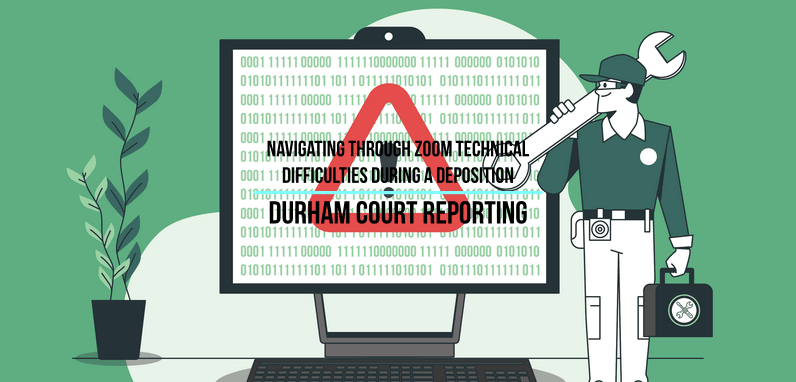
With the rise of remote depositions, the use of video conferencing platforms like Zoom has become commonplace in the legal profession. While remote depositions offer convenience and flexibility, they also come with the potential for technical difficulties that can disrupt the proceedings. In this blog, we will explore common Zoom technical issues that may arise during a deposition and provide practical tips to navigate through them smoothly, ensuring a successful remote deposition experience.
Prepare in Advance:
Preparation is key to minimize the risk of technical difficulties. Familiarize yourself with Zoom’s features and functionality, and ensure that your device meets the technical requirements for a smooth deposition. Test your internet connection, audio, and video quality before the deposition begins. It’s also advisable to have a backup plan, such as a secondary device or a phone line, in case of unexpected issues.
Have a Dedicated Technical Support Contact:
Identify a dedicated technical support contact who can assist you promptly if any issues arise during the deposition. This can be a colleague, an IT professional, or even a videographer/zoom tech if present. Communicate their contact information to all participants in advance so they know whom to reach out to for immediate troubleshooting.
Address Bandwidth and Internet Issues:
Internet connectivity problems are one of the most common issues during remote depositions. If you experience lagging audio or video freezing or dropped connections, there are a few steps you can take. First, close any unnecessary applications or browser tabs to conserve bandwidth. If possible, connect to a wired internet connection instead of relying on Wi-Fi, as it tends to be more stable. If the issues persist, consider rescheduling the deposition or switching to an alternative video conferencing platform.
Troubleshooting in Real-time:
During the deposition, if technical issues arise, it’s crucial to address them promptly without disrupting the proceedings. If you experience audio or video issues, try muting and unmuting your microphone or turning off and on your camera. You can also try leaving the meeting and rejoining to refresh the connection. If these quick fixes don’t resolve the issue, inform the other participants and pause the deposition briefly to troubleshoot further or to switch to an alternative communication method temporarily. If there is a videographer present, they can usually fix most issues quickly.
Maintaining Professionalism and Patience:
Technical difficulties can be frustrating, but it’s crucial to maintain professionalism and patience throughout the deposition. Encourage participants to communicate openly about any technical issues they encounter, to remain calm, and to work collaboratively to find solutions. Emphasize the importance of allowing extra time for troubleshooting and being flexible with the deposition schedule.
While technical difficulties during remote depositions can be disruptive, being prepared and proactive can help navigate through these challenges effectively. By establishing a strong connection, addressing audio and video issues, managing document and exhibit sharing, having backup plans, and maintaining professionalism, participants can overcome Zoom technical difficulties and ensure a successful and productive deposition. With proper troubleshooting and a patient approach, legal professionals can adapt to the digital environment and continue to facilitate the deposition process efficiently.
To book your next deposition, Please call our office at 919-682-7757 or Click Here!
The Olympics of Court Reporting

The legal profession has rapidly adapted to the digital age, embracing technological advancements that enhance efficiency, reduce costs, and provide greater flexibility. One such innovation is the emergence of Zoom hybrid depositions, which combine traditional deposition practices with the power of video conferencing. In this blog post, we explore why attorneys are increasingly opting for Zoom hybrid depositions and the benefits they offer in today’s fast-paced legal landscape.
Convenience and Efficiency:
Zoom hybrid depositions provide attorneys with unparalleled convenience and efficiency. By leveraging video conferencing technology, attorneys can conduct depositions remotely, eliminating the need for extensive travel. This saves valuable time and resources, allowing attorneys to focus on other critical aspects of their caseload. Additionally, scheduling becomes more flexible as participants can join the deposition from various locations, accommodating their availability and reducing scheduling conflicts.
Cost-Effectiveness:
Travel expenses, including accommodation and transportation, can quickly escalate during traditional in-person depositions. Zoom hybrid depositions significantly reduce these costs, making them an attractive option for attorneys. By conducting depositions remotely, attorneys can allocate their resources more efficiently, ensuring that their clients receive cost-effective legal representation without compromising the quality of the deposition process.
Increased Access to Witnesses and Experts:
Zoom hybrid depositions break down geographical barriers, enabling attorneys to access witnesses and experts who may be located far away or in different jurisdictions. This expanded reach allows attorneys to secure critical testimonies without the logistical challenges associated with travel and coordination. As a result, attorneys can build stronger cases by accessing a broader pool of knowledgeable and relevant witnesses.
Flexibility in Document Sharing:
In a traditional deposition setting, attorneys often rely on physical copies of documents and exhibits. Zoom hybrid depositions provide an opportunity to digitize the process, allowing attorneys to share electronic documents seamlessly. With screen-sharing capabilities, attorneys can present exhibits in real-time, ensuring that all participants have simultaneous access to the materials. This digital approach promotes efficiency, collaboration, and a streamlined deposition experience.
Improved Focus and Engagement:
While some may argue that virtual interactions can lead to distractions, Zoom hybrid depositions can actually enhance focus and engagement. Attorneys have the ability to maintain a central role in the deposition, directing the questioning and managing the proceedings effectively. Additionally, the virtual environment can reduce interruptions and disruptions, allowing for a more fluid and focused deposition experience.
The advent of Zoom hybrid depositions has revolutionized the way attorneys approach depositions, offering convenience, cost-effectiveness, and expanded access to witnesses and experts. Embracing this technology allows attorneys to streamline their workflow, improve efficiency, and ultimately provide enhanced legal services to their clients. As the legal profession continues to evolve, Zoom hybrid depositions have emerged as a valuable tool, empowering attorneys to navigate the complexities of modern litigation effectively.
To book your next deposition, Please call our office at 919-682-7757 or Click Here!
The Olympics of Court Reporting
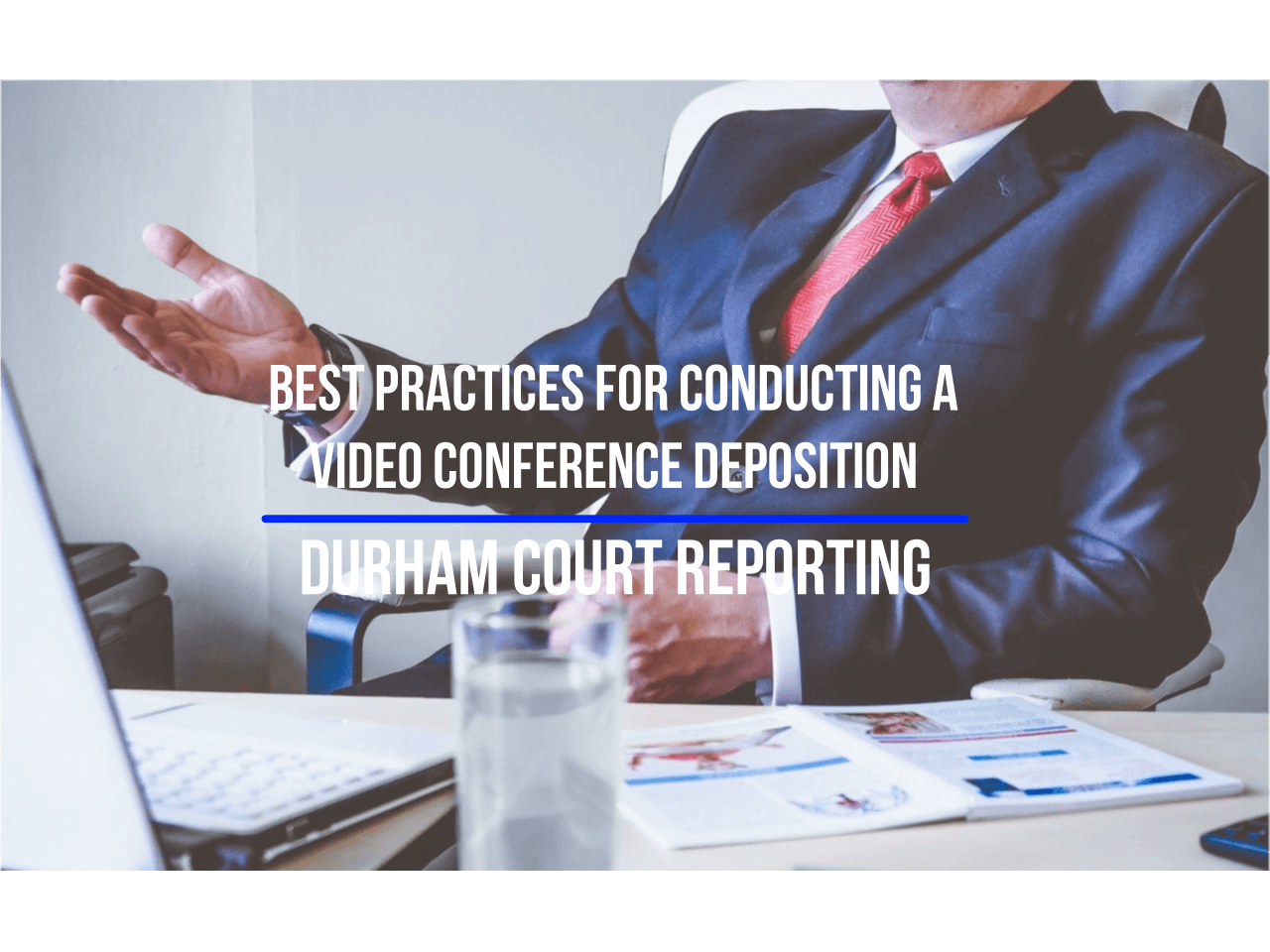
As the use of video conferencing technology becomes increasingly common in legal proceedings, attorneys must adapt to this new form of communication. Depositions, in particular, are a critical step in the litigation process and require careful preparation to ensure that all necessary information is obtained. Here are some best practices for conducting a video conference deposition:
Choosing a reliable video conferencing platform.
There are many video conferencing platforms available, such as Zoom, Webex, and Skype. Select a platform that is reliable, user-friendly, and has features that are suitable for your deposition needs.
Prepare the witness:
Make sure that the witness has a stable and reliable internet connection as well as a high-quality microphone and webcam, also make sure your witness is comfortable with the technology and understands how to use it. Consider providing them with a brief tutorial or practice session beforehand.
Use Visual Aids and Exhibits:
Share exhibits and visual aids electronically to all participants in advance. Coordinate with the court reporter to ensure they have access to any exhibits for reference. During the deposition, use screen sharing capabilities to present exhibits seamlessly, allowing everyone to follow along.
Manage the Environment:
Ensure that your surroundings are professional and free from distractions. Find a quiet space with adequate lighting and minimal background noise. Try to plan your deposition out on a day when you won’t have any lawn care or loud dogs around the house. Remove any potential interruptions such as cell phone notifications, loud appliances. Consider using a neutral background or a virtual background if available.
Be mindful of body language:
Since the video conference deposition may lack the intimacy of an in-person deposition, it’s important to pay attention to your body language. Maintain eye contact, sit up straight, and avoid any distracting behaviors (like fidgeting or tapping).
By following these best practices, attorneys can conduct effective and efficient video conference depositions that are just as productive as in-person depositions.
To book your next deposition, Please call our office at 919-682-7757 or Click Here!
The Olympics of Court Reporting
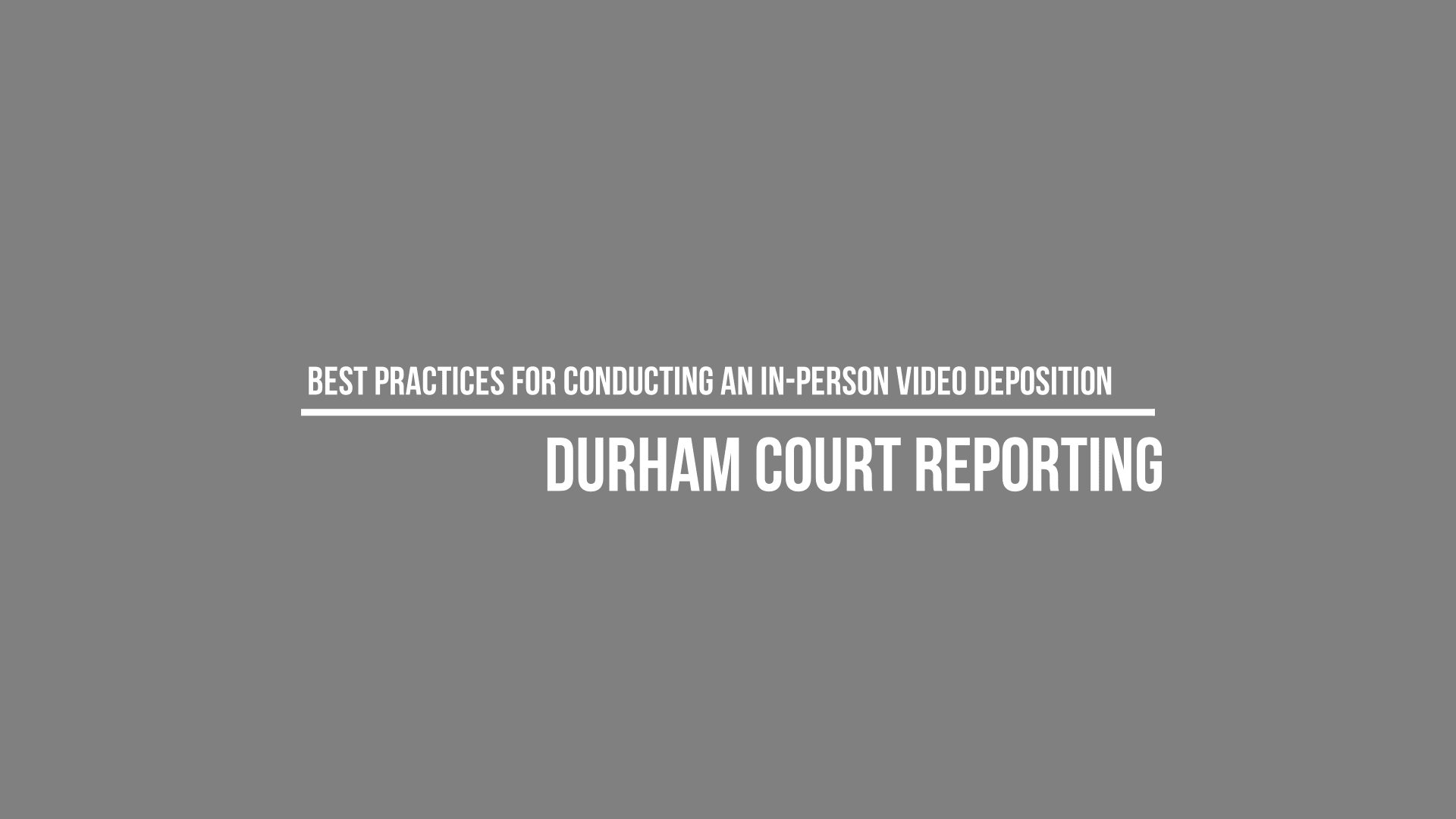
In-person video depositions have become increasingly common in today’s legal world. In this blog, we will discuss some best practices for conducting an in-person video deposition.
Minimize Distractions
When conducting an in-person video deposition, it’s important to minimize distractions. Turn off your phone and any other electronic devices that could interrupt the deposition.
Putting on Your Microphone Properly & What Not to Do While You’re Mic’d up
When putting on your lavalier microphone, you must ensure the microphone is pointed at your face and it’s clipped on at about chest level. You don’t want to put it on anything dangling due to it causing a bunch of extra noise. Another tip is trying not to touch or shuffle documents on the microphone until you are off the record, as the microphones are extremely sensitive and could cause audio clipping.
Review exhibits thoroughly:
When presenting exhibits, ensure they are marked appropriately and shared with all participants. Clearly identify each exhibit and give the witness time to review and respond to questions related to the exhibits. Be sure to have your exhibits in order to make sure your deposition runs smoothly. If you would like the exhibits presented in the video, let the videographer know to ensure you get the end product you are looking for.
Take breaks if needed:
Depositions can be lengthy, and it’s essential to stay focused and maintain your concentration. If you need a short break, communicate this with the other participants and request a pause in the proceedings. Please wait until the videographer goes off the record before making small talk.
Maintain professional conduct:
Project professionalism through your body language, tone of voice, and demeanor. Avoid displaying frustration, impatience, or other negative behaviors that might hinder the deposition process.
In conclusion, conducting an in-person video deposition requires careful planning, attention to detail, and specialized technology and equipment. By following these best practices, you can conduct a successful video deposition that accurately captures witness testimony and helps you build a strong case.
To book your next deposition, Please call our office at 919-682-7757 or Click Here!
The Olympics of Court Reporting
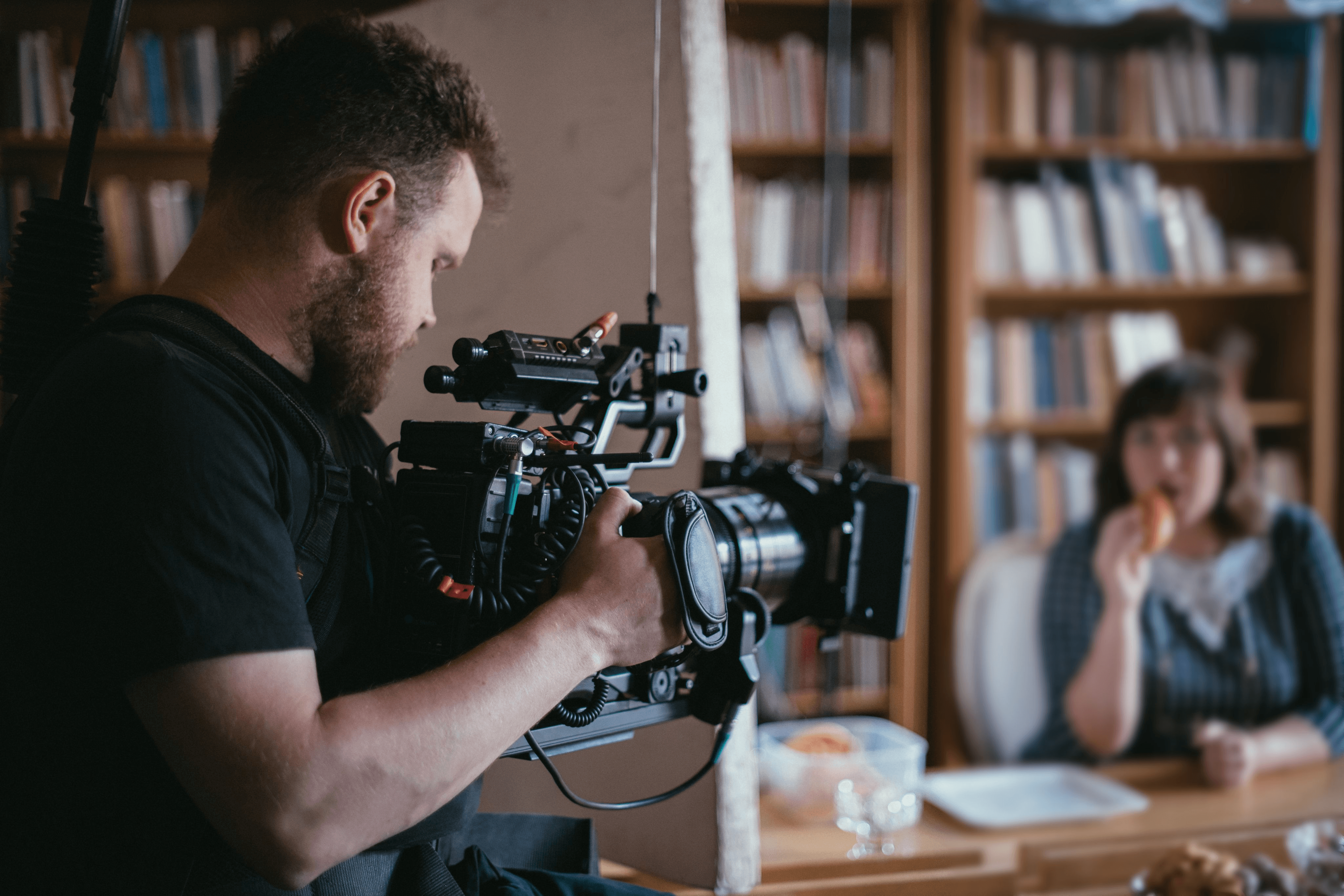
What Is A Deposition?
A deposition is an out-of-the-courtroom interrogation, typically where the witness or deponent will be asked a series of questions about facts and/or events regarding the lawsuit all while the court reporter is present and capturing spoken words and important information to later turn into a transcript.
Why Should I Consider Adding Video?
A typical deposition includes a transcript, which can be effective in court; however, it is difficult for this to convey the deponent’s demeanor during the deposition. For instance, the deponent might not like a question asked and might answer angrily or maybe even get nervous and start fidgeting, take long pauses between the question being asked and answering the question. Capturing these small details could be major to your case and can be beneficial by allowing the jury to see physical evidence of a particular behavior. Adding video to your case will strengthen its integrity because, although it is not common, court reporters can make mistakes, especially if the deponent is prone to slurring or mumbling or has a strong accent. Having a video of the deponent’s testimony ensures you have proper evidence and prevents the possibility of the deponent changing their testimony later on. It is also important to note that the transcript does not show long pauses or maybe even stuttering. Missing these factors could change the whole tone of your case.
Who Do You Hire?
You will want to make sure you hire someone who has professional expertise in legal video and has been trained to work the camera properly. The legal videographer’s job is to make sure they capture the deponent’s testimony and mannerisms.
Here at Durham Court Reporting, we understand that everyone’s deposition is different and will require different specialties. We go above and beyond to make sure everything your deposition might need from a court reporter to a videographer to an interpreter is covered in one place. We look forward to scheduling your next deposition!
The Olympics of Court Reporting
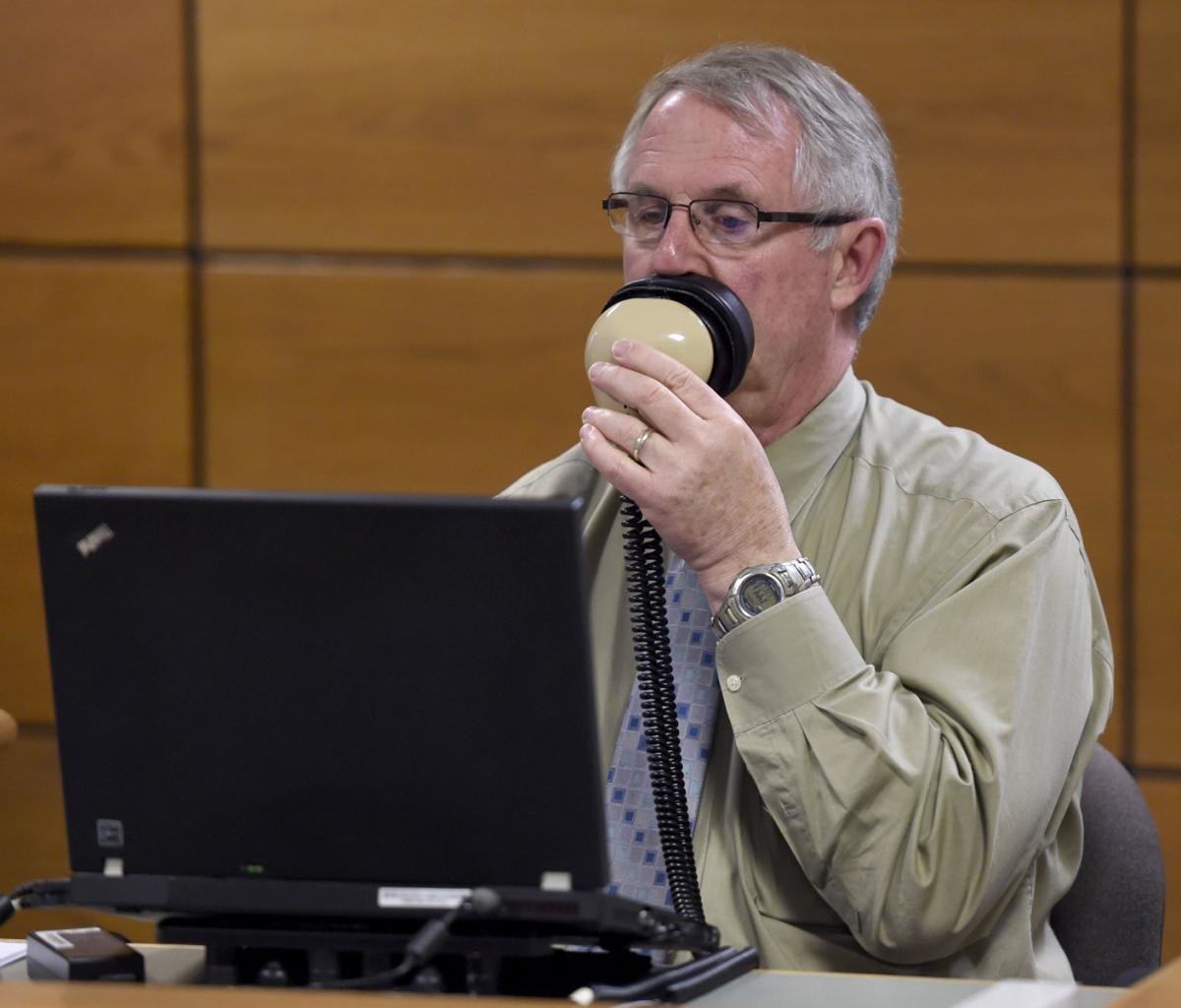
Court reporters use their arms, hands, and fingers all day, every day, so it’s not surprising that many court reporters develop some type of repetitive motion injury. They’re also at high risk of developing neck and back problems because the job requires that they sit in a fixed position for hours at a time. These injuries can cut a court reporter’s career short and decrease their earning power, but an increasing number of stenotype (machine) court reporters have been able to prolong their careers by switching to the voice writing (Stenomask) method of capturing the record.
Unlike machine writers, voice writers do not have to sit with arms outstretched in a fixed position while on the record. Using the voice writing method, the court reporter holds a “mask” (Stenomask) to their face while dictating the proceedings. Because both hands are not required to hold the mask in place, a voice writer can switch hands while on the record without skipping a beat – and can give one arm a break. Also, Stenomask manufacturer Talk Technologies has developed a hands-free strap that holds the device in place. The down side of using a hands-free strap is that to the untrained observer it can seem that the court reporter is wearing some kind of breathing apparatus.
Converting from machine to voice writing is far less time-consuming than converting from voice to machine writing would be. Because an experienced court reporter already knows the industry and how to prepare a professional transcript, that reporter only needs to train their voice, which can take as little as a few months, and become familiar with voice writing equipment and software.
One North Carolina-based court reporter who successfully transitioned from machine to voice writing (due to tendinitis) has prepared a guide for other stenotype court reporters who would like to transition to voice.
In addition to machine and voice writers, digital (electronic) court reporters routinely provide services at depositions, hearings, and in courtrooms across the country. At Durham Court Reporting we’re proud to have professional court reporters using all three methods on staff. To schedule your next deposition with Durham Court Reporting, use our online scheduling form or call 919-682-7757.
The Olympics of Court Reporting

There are essentially three different national licensing boards for court reporters: NCRA (National Court Reporters Association), NVRA (National Verbatim Court Reporters Association), and AAERT (American Association of Electronic Reporters and Transcribers). Each national organization has their own certifications. Once you obtain certification within the organization you hold a membership with, then you are also required to maintain continuing educational credits to maintain said certification.
Certifications within NCRA for court reporters:
RSR – Registered Skilled Reporter. You must pass the skills test at 200 words per minute (WPM)
RPR – Registered Professional Reporter. You must pass the skills test at 225 WPM
RMR – Registered Merit Reporter. You must pass the skills test at 260 WPM
RDR – Registered Diplomat Reporter. You must pass your RPR or RMR and be in the profession for 5+ years and pass a 120 question test
CRR – Certified Realtime Reporter. You must pass a realtime online test at 200 WPM with 96% accuracy
Certifications within NVRA for court reporters:
CVR – Certified Verbatim Reporter. You must pass the skills test at 225 WPM
CM – Certificate of Merit. You must pass the skills test at 260 WPM
RVR – Realtime Verbatim Reporter. You must pass a skills test at 180 WPM with 95% accuracy
Certifications within AAERT for court reporters:
CER – Certified Electronic Reporter. To obtain this certification, you are required to pass an online knowledge examination and pass with a score of 80% or higher
Durham Court Reporting is proud to belong to all three national organizations and have reporters with national certifications. When you need a certified court reporter in Durham, please give us a call at 919-682-7757 or book online.
The Olympics of Court Reporting

There are many things that go into taking a deposition and then preparing the transcript, and lots of small but important details the court reporter must keep up with. Here’s a list of things attorneys can do to ensure they receive a timely, accurate transcript from their court reporter.
• At the time of scheduling, provide the court reporting firm with the Notice of Deposition or the full caption. The document you provide should include all counsel of record in the case.
• When you arrive at the deposition suite, introduce yourself to the court reporter, present your card and indicate whom you represent. This is especially important if there are multiple plaintiffs or multiple defendants.
• At the beginning of the deposition, take a few minutes to give the witness a complete set of instructions. For instance, you might say something like this:
“Good morning. I want to just give you some ground rules. I will try not to keep you here any longer than I need to. Please give me verbal responses to my questions if you can, because the court reporter can’t record hand gestures or nods of the head. If you can remember to let me finish my question before you start your answer, it’ll make the court reporter’s job a whole lot easier. It’s almost impossible for the reporter to take the record if we’re both speaking at the same time. If at any point I ask a question you don’t understand, let me know that, and I’ll be happy to rephrase it or repeat it. If you want to take a break at any point, get up, stretch, use the restroom, you can do that. I only ask that you answer any question that’s pending before we take a break.”
• Always ask the witness to state and spell his full name so the record accurately reflects the correct spelling.
• If witness gestures in any way, restate their actions. For example, “For the record, the witness pointed to her left shoulder.”
• Read documents slowly and note when the quoted material begins and ends. “In Paragraph 3 of Exhibit 7, it indicates, quote, ‘Please keep hands and feet inside car at all times,’ end quote.”
• Provide the court reporter with a copy of any documents that are read into the record.
• Allow the court reporter to mark and keep track of the exhibits, which will ensure consistent and sequential numbering. Don’t forget to allow the reporter to completely mark the exhibit before asking your next question.
• State “off the record” before going into comments that are supposed to be off the record. Keep in mind that the court reporter cannot officially go off the record unless all parties agree to go off the record.
• When you’re ready to go back on the record, be sure to say, “Back on the record.”
• Make sure the court reporter is able to sit next to the witness or interpreter.
• During telephone depositions, identify yourself before speaking so that you are properly identified in the transcript.
• Don’t ask the court reporter for their opinion of the witness or the testimony.
• The court reporter’s job is mentally and physically taxing. Plan to take a short break, about ten minutes, every hour and a half, and at least 30 minutes for lunch. (Court reporters can’t take a “working” lunch.)
• If you can’t clearly hear the witness, the reporter can’t either. Ask the witness to speak up or enunciate to avoid the reporter having to interrupt.
• Avoid rustling papers or tapping on the table. Both of those actions will interfere with audio recording.
By incorporating these tips into your deposition practice, you’ll ensure that your court reporter has all of the necessary tools to prepare an accurate and timely transcript.
To book a court reporter with Durham Court Reporting, please call us at: 919-682-7757 or fill out an online request at: Schedule Now